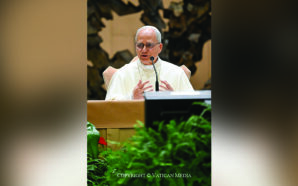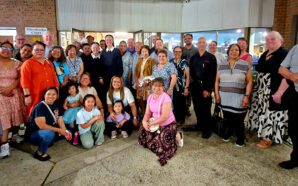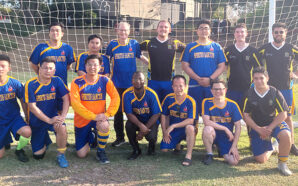Homily for the Thirteenth Sunday in Ordinary Time
Readings: 1 Kings 19:16b, 19-21; Psalm 16; Galatians 5:1, 13-18; Luke 9:51-62
26 June 2022
In today’s second reading, Paul tells the Galatians:
Brothers and sisters:
For freedom Christ set us free;
so stand firm and do not submit again to the yoke of slavery.
For you were called for freedom, brothers and sisters.
But do not use this freedom
as an opportunity for the flesh;
rather, serve one another through love.
Listen at https://soundcloud.com/frank-brennan-6/homily-26622
During the week, we celebrated the feast of St Thomas More, an exemplar of freedom, one who refused to be subjected to the yoke of slavery, one who used his freedom not for his own advancement or security but in order to proclaim the gospel of love and truth.
In his biography, The Life of Thomas More, Peter Ackroyd recalls the conversation between William Roper and Thomas More after Henry VIII had visited Chelsea to discuss the matter of a possible annulment of his marriage to Catherine. Ackroyd observes, ‘Henry seems genuinely to have convinced himself that he had incurred divine displeasure by marrying his dead brother’s wife and that as a result he had merited the biblical punishment of conceiving no male issue from the forbidden union. Yet at the same time he was pursuing Anne Boleyn with gifts and letters. It would not take a cynic to suggest that his desire for an annulment was prompted by sexual as well as religious reasons. But this was the point that could never be made in public.’[1]
Some time after the King’s visit, while walking along the riverside at Chelsea with William Roper, Thomas More said, ‘Now would to our Lord, son Roper, upon condition that three things were well established in Christendom, I were put in a sack and here presently cast into the Thames.’ Roper asked, ‘What great things be those, sir, that should move you so to wish?’ More replied, ‘In faith, son, they be these. The first is, that where the most part of Christian princes be at mortal wars, they were all at an universal peace. The second, that where the Church of Christ is at this present sore afflicted with many errors and heresies, it were well settled in a perfect uniformity of religion. The third, that where the King’s matter of his marriage is now come in question, it were to the glory of God and quietness of all parts brought to a good conclusion.’[2]
I daresay until there be universal peace amongst nations and agreement on all matters theological in the Church, there will always be work to be done by the likes of Thomas More, regardless of the nuptial status of our leaders. And he will always be there to provide us with inspiration.
My recently deceased father had a great devotion to Thomas More. Just after he went on to the High Court bench, Dad delivered a lengthy speech on ‘The Peace of Sir Thomas More’ in which he spoke of More as ‘the paradigm of independence’:
‘He shows us that an individual cannot be made independent by others who satisfy his wants; independence is secured by the individual who sheds them. Independence is not a worldly attribute; it is an attribute of a man at peace. The strength of such a man flows not from position, possessions or power, but from a concordance between conscience and action.’[3]
Dad returned to this theme of independence two years later in a speech entitled ‘The Independence of Thomas More’. He described independence as ‘the quintessential professional virtue’: ‘Independence of popular acclaim, of power or patronage, of wealth, of improper influence by State or Church, by family or friends. It is a lonely virtue which, if it is not to be transformed into stubborn arrogance, requires humility of mind, devotion to learning, and breadth of experience.’[4]
After his retirement as Chief Justice he addressed the St Thomas More Society in Sydney recalling that he had a photo frame on his desk with postcards of the Holbein portraits of Thomas More and Thomas Cromwell from the Frick Collection in New York – ‘contemporaries, one of whom could interpret accurately the signs of the times, the other a masterful reader of the sky in Tudor England. More discerned what was good and valid; Cromwell perceived what was expedient and humanly sensible.’[5] Ultimately each lost his head.
My father observed: ‘More died rather than deny his conscience. It was not a conscience that followed the ipse dixit of the Bishops of his Church. It was not a conscience that was born out of institutional loyalty. It was a conscience that grew over the years of prayer, study and reflection and the daily penance of the hair shirt.’
Dad went on to say:
‘[T]o discharge Our Lord’s commission to Peter to feed my lambs and sheep and His direction to the Apostles to teach all nations, the Church must proclaim the truth intelligently and inspirationally to all. This is primarily the function of the Pope, the Bishops and the clergy, but it is a function incumbent on the laity as well. What will not do is an authoritarian demand for conformity – a demand that carries no conviction to the mind of the faithful and is alienating to those outside the Church.’
This was his key sentence about More’s conscience: ‘It was a conscience that sought to understand the Divine Will and, having understood it, to be obedient to the truth he saw.’ He asserted, ‘Conscience is unique to each person and what is done in obedience to conscience by one may differ from what is done in obedience to conscience by another. In any event, as consciences do differ, the external expression of conscience by one may differ from what is done in obedience to conscience by another’.
He expressed his sadness that Cardinal George Pell had taken to saying, ‘Catholics should stop talking about the primacy of conscience. This has never been a Catholic doctrine (although this point generally cuts little ice). Moreover, such language is not conducive to identifying what contributes to human development. It is a shortcut, which often leads the uninitiated to feel even more complacent while “doing their own thing”.’[6]
My father observed: ‘Had Thomas More and John Fisher followed not their consciences but the majority of the English Bishops at the time, we would not have had their example to inspire the human spirit and the history of the Church and of England would have been the poorer.’
This led to a detailed respectful correspondence between Pell and my father. Honouring my deceased father and the confidentiality of the correspondence from Cardinal Pell, might I simply close with a few quotes from my father’s letter to Cardinal Pell on 29 January 2002:
‘[W]hen officers of the church – even the Roman dicasteries – or individual bishops assert the power to prescribe what individuals or groups must do or refrain from doing, submission must surely depend on whether the individual consciences accept the prescription.’
‘But there can be no conflict between truth and reason, nor should there be any fear of discussion of the truth. I confess that the Pope’s prohibition of discussion on his teaching about women’s ordination seems to suggest that discussion is the enemy of truth. Far from leading to acceptance of the teaching, the prohibition casts doubt upon what is taught. It is counter-productive. Teaching authority of the Church is one thing; the power to compel belief is another.’
‘For me, the Church has authority to teach what is true and, as she proposes truth for my acceptance, I love and trust her. But that is an authority over religious truth, not an authority to compel belief or action. I fear the distinction is being missed in the ecclesiastical bureaucracy of today.’
I’m one Australian Catholic grateful for the commitment to conscience displayed by my father, the late Sir Gerard Brennan. I’m delighted that he and Cardinal Pell could disagree cogently and respectfully. Long may the peace and independence of Sir Thomas More continue to inspire and challenge us as we prepare for the next phase of our Plenary Council.
You are my inheritance, O Lord.
Keep me, O God, for in you I take refuge;
I say to the LORD, “My Lord are you.
O LORD, my allotted portion and my cup,
you it is who hold fast my lot.”
You are my inheritance, O Lord.
I bless the LORD who counsels me;
even in the night my heart exhorts me.
I set the LORD ever before me;
with him at my right hand I shall not be disturbed.
You are my inheritance, O Lord.
Therefore my heart is glad and my soul rejoices,
my body, too, abides in confidence
because you will not abandon my soul to the netherworld,
nor will you suffer your faithful one to undergo corruption.
You are my inheritance, O Lord.
You will show me the path to life,
fullness of joys in your presence,
the delights at your right hand forever.
You are my inheritance, O Lord.
[1] Peter Ackroyd, The Life of Thomas More, Doubleday, 1998, p. 269
[2] Ibid, p. 270
[3] F G Brennan, ‘The Peace of Thomas More’, Thomas More Lecture, 30 October 1981, Brisbane, published in Utopia, The Journal of the Thomas More Society, Sydney, Volume 1, Issue 1, 1990
[4] F G Brennan, ‘The Independence of Thomas More’, 1983.
[5] F G Brennan, ‘The Sky is Red’, Address to the Thomas More Society, Sydney, 6 July 2000, published in Utopia, The Journal of the Thomas More Society, Sydney, Volume 2, Issue 1, May 2001, pp. 3-7
[6] Archbishop George Pell, ‘Catholicism and the Architecture of Freedom: the Inaugural Acton Lecture on Religion and Freedom’, Customs House, Sydney, 4 August 1999. By way of follow up, Archbishop Pell then said, ‘In the past I have been in trouble for stating that the so called doctrine of the primacy of conscience should be quietly dropped. I would like to reconsider my position here and now state that I believe that this misleading doctrine of the primacy of conscience should be publicly rejected.’ (“From Vatican II to today – Address to Catalyst for Renewal’s Bishops Forum”, 30 May 2003).
Fr Frank Brennan SJ is the Rector of Newman College, Melbourne, and the former CEO of Catholic Social Services Australia (CSSA). He has been appointed a peritus at the Fifth Plenary Council of the Australian Catholic Church.








